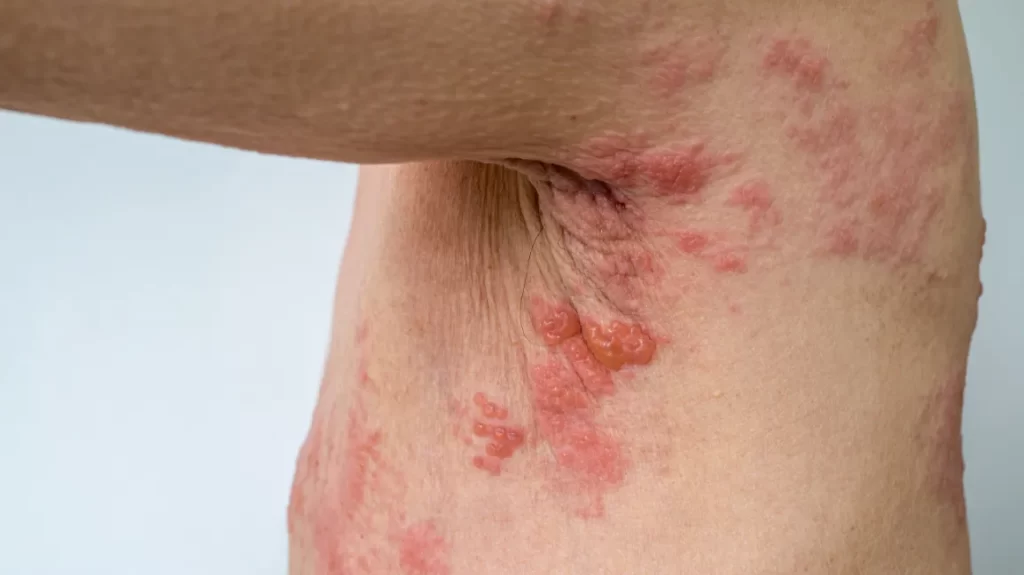Painful Rash: Shingles Vaccination in Streatham and Norbury
For most people, getting shingles means a few weeks of uncomfortable, unusual pain and some unpleasant side effects. But shingles can be serious and even deadly for older adults with weakened immune systems or other chronic health problems. Westbury Chemist’s travel clinic offers a vaccine to prevent the infection.
Shingles are not a contagious infection. However, it is caused by the same virus that causes chickenpox. If you have not had chickenpox before and you are in proximity to someone who has the shingles, you could contract the chickenpox infection.
Our travel clinic appointments are from 10:00 am – 17:00 pm Monday to Saturday
Book Shingles Vaccine Online
How does the vaccination help?
Shingles are caused by the varicella-zoster virus — the same virus that causes chickenpox. Anyone who has had chickenpox may develop shingles later in life because the virus remains active in your body even after you recover from chickenpox. When the virus is reactivated years later, it travels along nerve pathways to your skin and causes a rash to erupt. A vaccine can help prevent shingles from developing in the first place or prevent complications once you have it.

Symptoms of the shingles rash
Shingles can present with the following symptoms:
- A tingling or painful sensation on the skin
- Accompanied by a headache or general feeling of discomfort
It takes a few days for a rash to appear.
A shingles rash usually appears on your chest and tummy but can occur on any part of the body, including the face, eyes, and genital area.
Your skin is blotchy, but only on one side of your body. You are unlikely to have shingles if you have a rash on both sides of your body.
Reference: NHS
Who should get the shingles vaccine?
You might be surprised to hear this, but the shingles vaccination is not just for people in their seventies. Any adult over 50 who has not already had chickenpox may want to consider getting vaccinated. This includes anyone with a weakened immune system or who has had a transplant (like heart, liver or kidney). Additionally, if you are HIV positive and have never been immunised against chickenpox, you should also get the shingles vaccine.
The vaccine is only effective if given within three months of exposure to varicella-zoster virus (the virus that causes both chicken pox and shingles).
Treating shingles at home
As well as taking the vaccine, there are some efforts you can make at home to treat the shingles. The NHS recommend trying the following steps:
- Take paracetamol to help with the pain and discomfort
- Keep the rash clean and dry to reduce the risk of infection
- Wear loose-fitting clothes
- Use a cool compress (frozen bag of peas, ice pack or a cool or wet towel) a few times a day.
Side effects of shingles vaccination
- Headache
- Redness, pain, swelling, itching and warmth at the injection site
- Fatigue
Now and then, a person who has had the shingles can later develop the chickenpox
Consult your GP or practice nurse if any side effects persist.
How long do the benefits of the vaccination last?
The vaccine’s effectiveness varies for each person, and it can be less than 100%. Vaccine protection can gradually decrease over time.
This can occur in healthy adults who are vaccinated as well as in people with poor immune systems.
The shingles vaccine may not protect you if you have a weakened or damaged immune system caused by diseases such as HIV/AIDS or cancers such as lymphoma (cancer of the lymph nodes). The benefits of vaccination could also be reduced if your immune system has been weakened through treatments such as chemotherapy or radiation therapy.
Getting vaccinated against shingles can help protect you from getting it later on.
Shingles is a painful rash that can develop in one or more areas of the body. It’s caused by the same virus that causes chickenpox, but this time it settles in your nerves rather than your skin cells. Although most people will get shingles at some point in their lives, it’s more likely to affect older people and those who have weakened immune systems.
Shingles are usually treated with painkillers, antiviral medication and sometimes steroids for inflammation – however, there are now vaccines available to protect against getting shingles in the first place.
More Information on Shingles
If you think you might be eligible for the shingles vaccine, check with your doctor. The vaccine is not 100% effective and not everyone can get vaccinated. It’s also important to note that the vaccine is a series of two shots—the second shot must be given at least six months after the first. If you have questions about shingles vaccines, talk with your pharmacist or healthcare provider before receiving treatment from them.
The vaccine is not recommended for people who have weakened immune systems due to medical conditions such as HIV/AIDS, leukaemia or lymphoma (cancer), organ transplantation, diabetes mellitus type 1 or 2; chronic liver disease; kidney disease; active hepatitis B infection; multiple sclerosis (MS).
Visiting Westbury Chemist for your Shingles Vaccine in Streatham
Westbury Chemist Streatham is now providing shingles Jabs. We do not accept walk-in appointments. Please book your appointments online.

